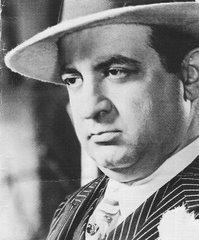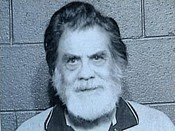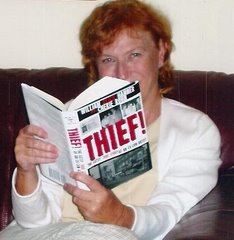 It was the late 1920s and the Mob's financial genius, Meyer Lansky the visionary, was telling his associates, Frank Costello, Lucky Luciano and Bugsy Siegel how they were going to make money after the stock market crashed.
It was the late 1920s and the Mob's financial genius, Meyer Lansky the visionary, was telling his associates, Frank Costello, Lucky Luciano and Bugsy Siegel how they were going to make money after the stock market crashed.Lansky said that everyone was investing in the stock market, including his fiancé. But Lansky advised her to sell all her stocks even though he was the one who told her to invest. She thought he was crazy. Even the kid who shined his shoes told Lansky he had fifteen shares of some stock. Lansky explained to his friends that they must get out of the stock market now, even if they took a loss. The few millionaires who controled the market were bigger crooks than anyone could imagine. They knew the market was extremely over-bought and couldn't go up forever. The day would come when the big investors would sell every stock they owned. Without them in the market, the bottom would fall out. Some of Lansky's gang scoffed at his words. To that he answered that you don’t need a crystal ball. You simply need to know what’s happened in the past and, most importantly, why. Then you can predict what will happen in the future.
Lansky described the conditions following WWI. In 1919, after the war, people went wild buying stocks that almost doubled in value overnight. But the Wall Street brokers never bought. They only sold. If stocks were such a good investment, why weren’t they buying?
It was because the market was inflated. The brokers knew it was getting ready to go bust. And when it did, those pieces of paper would be worthless. After the market crashed, great business opportunities came along. The suckers who believed the brokers about getting rich were selling their houses and businesses for ten cents on the dollar. None of the Lansky gang had the money or knowledge to take advantage back then.
He told his associates he thought it would take less than a year for the bottom to drop out. By then they'd be in an excellent position with ready cash. When the American dream ends, they would be the only ones with the liquid assets to buy what was left for peanuts. Lansky, true to his word, purchased land and legitimate businesses for a fraction of their real value.
Maybe Meyer's advice comes a tad late f0r those who lost money recently. But his wise words bear remembering.
I think Lansky would have spotted the likes of a Bernie Madoff Ponzi scheme right off the bat. Madoff was pitching gains that were farfetched by any real standards. However, greed blinds people. Many investors lost their shirts believing Bernie Madoff knew how to make gobs of money. He did...for Bernie Madoff.Mobwriter








